JIU Josai International University

Talk session with a film producer: Learn about video production through examples
Faculty Department
2025.05.23
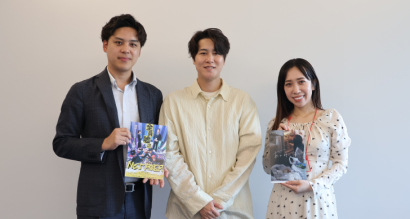
From the left: Mr. Kawamata, Assistant Professor Nakagawa, and Mr. Kageyama
In the class "Video Production" (instructor: Assistant Professor Hirotaka Nakagawa) of Film and Performing Arts Course Faculty of Media Studies, we held a class that included a viewing of works directed by Assistant Professor Nakagawa, "NOT BEER" and "Let's Go Back to That Light," as well as a talk session with the film producer. We had a talk session about directing with the two producers of the works, and it was an opportunity to learn about actual examples of video production.
NOT BEER
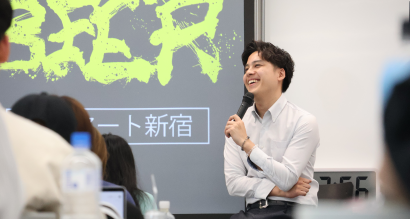
Producer: Takayoshi Kawamata (graduated from Faculty of Media Studies in 2014)
Kawamata-san is currently the representative of GoEn Co., Ltd., which is involved in film and stage production and casting. Assistant Professor Nakagawa and I were in the same filmmaking club in college and made films together. This NOT BEER is the first time we have teamed up as director and producer.
How I came to create this work
Kawamata: I was working with a major video production company, but then the COVID-19 pandemic hit and all the work disappeared. I couldn't continue without income for several months, so I decided to start something. From there, I reached out to my classmates from JIU and gathered some members. I worked hard to put together a film plan and found a company that was willing to invest in the production.
Professor Nakagawa: Kawamata-san suddenly called me and asked if I wanted to make a movie. From then on, we worked on a very tight schedule, including writing the script and shooting the film.
About the filming and production
Nakagawa-sensei: The heavy scene at the end of the story was scheduled to be shot as the second scene on the first day of shooting. What I remember most about that is that I told them to make sure to create a good "interval" when acting. Since we had just entered the scene, I was conscious of not letting the dialogue become monotonous.
Kawamata: Were there any points that you consciously had the director improvise?
Nakagawa-sensei: There was a scene where I wanted to get laughs, but if I were to shoot the same scene with the actors over and over again, it would become monotonous, so I was conscious of changing the mood to keep it fresh.
Kawamata: This time, I was also in charge of things that an assistant director would do, so there were times when I couldn't go to the set. At those times, I would suddenly find scenes I'd never seen before, and I would notice them during editing. This kind of thing happens because we're shooting with a synchronized team, and it was a surprise.
Nakagawa-sensei: That got me scolded by Kawamata-san. The producer is the one who looks at the whole project, and the director is the one who looks at the quality of the work, so sometimes we have different expectations. In fact, we were quite at odds about the theme song. I had imagined a bright, lively ska-like song, but Producer Kawamata had imagined a calm ballad.
I remember that we were arguing until the morning of the recording day, neither of us giving in. In the end, we decided to change the key of the song midway through, and we agreed on half of each other's opinions. The person who was doing the sound editing was famous in the industry, and even he, who always makes harsh comments, praised the song. I strongly felt that even if we were at odds, we should talk to each other until we were satisfied.
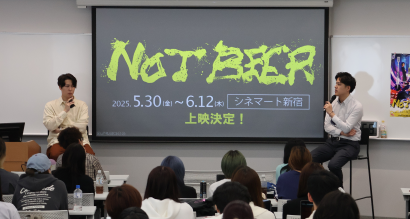
I want you to be particular
Kawamata: I think the reason we were at odds was because we both wanted to make good films. But when you graduate and decide to make a film, you will be on the receiving end of requests, and you will have to deal with financial restrictions and situations where you have to respect requests, so you will probably not be able to make the film you want to make as you hoped. I think that while you're a student, you should make what you want to make with passion.
Nakagawa Sensei: If you work hard, study a lot, and gain experience in a company, you may be able to become a director. Even if you do become a director, you don't know if you will be able to do what you really want to do. I want all students to do their best in what they can do now, and learn how to express themselves in the limited environments they will face in the future.
For students
Kawamata: I think casting is the best part of my job. Depending on the lead actor, production costs can skyrocket. That's what I find rewarding. That's why I want people to be particular about casting. Whether you're shooting an independent film or a movie, if you email the agency, they may respond kindly. Of course, passion and professional communication are important. If you express your passion, there will surely be people who agree with you. Even if it doesn't work out, the experience will be useful in the future.
Let's go back to that light
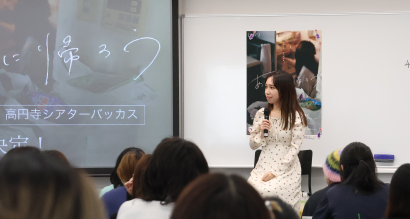
Actor/Producer: Hiromi Kageyama
Kageyama has been active as an actor since he was 10 years old. Currently, he is not only an actor, but also a producer of independent films. In this film, he played both the main character, Naumi, and the producer. When work decreased due to the COVID-19 pandemic, he started making films with his friends, which led him to work not only as an actor but also as a producer.
Communication between the director and the lead actor
Nakagawa-sensei: There was a flashback scene where he just walked around the shop. In the script, I wanted to show the loneliness and emptiness, so I originally planned to cut and connect the scenes in sync with the music. However, I suggested that we use the scene without cutting it, considering the gravity of the scene.
Kageyama: I think that by creating a long take without dialogue that can be made to look heavy even in a short film, it has the effect of helping the audience sort out their feelings. It also made it easier for me to convey my feelings when I acted, which I think had a positive effect.
Nakagawa-sensei: I also asked for detailed acting in the fighting scenes. Angry scenes tend to come off as forced, so I wanted realistic and natural acting. It may have been a difficult request to make it seem angry, incoherent, and not at all like normal tension.
Kageyama: I was asked to use my facial muscles, such as my eyes and mouth, in a way that made it seem like they were not in sync. But I actually had an image of the character's own personality being unclear about how to get angry, so I tried to act closer to the character.
Nakagawa-sensei: Actually, I don't think it's often the case that people get this angry in everyday life. I think a lot of people tend to be reserved and pull back these days, so I wanted to show the fear of getting angry in everyday life. The atmosphere on set was also very delicate, and the staff were careful to make sure the actors got into the role. There was a tense atmosphere.
I was also careful about even the wording. In a different scene, a sentence that was a question in the script was changed to a definitive statement in order to express the intention more strongly while acting on set.
Kageyama: I think we were able to express the feelings of the main character who can't stop himself. I think we were able to create a good film while shooting the film in the context of the relationship between the director and the lead actor.
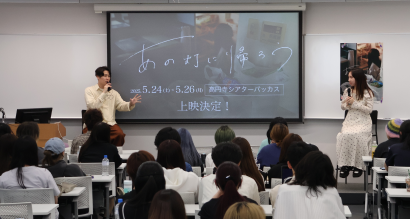
About promoting the film
Professor Nakagawa: NOT BEER has a promotional company, but you are also doing the advertising for this one. How was it?
Kageyama: I want to make a movie! I want to make a movie! It's important, but I think it's also important to have a lot of people watch the movie. I shot this movie about two years ago, but it's only just been decided that it will be screened. I feel that it's important to keep the same feelings I had when I was shooting it.
We mainly use social media for advertising. In addition, we have also produced merchandise related to the movie. It costs money to make a movie, so I feel that merchandise sales are very important. When we had a limited release of the movie in Toyohashi, it sold out. Of course, it's about money, but I also hope that having the merchandise in customers' hands will be a chance for them to suddenly remember the movie.
Nakagawa-sensei: At first glance, these goods may not seem related to the movie, but they are connected to the goal of getting as many people as possible to enjoy the movie, and they contribute to promoting the movie. Mr. Kageyama also designed the flyers and tickets. Before the release, he advertised through various media, including appearing on radio.
For students
Kageyama: It's hard to maintain your passion after filming is over, but having friends around gives you energy. They cheer you up when you're feeling down. In order to keep your passion going, don't forget the importance of working as a team. Please treasure your relationships with the friends you're taking classes with now.